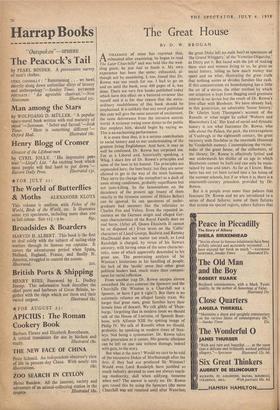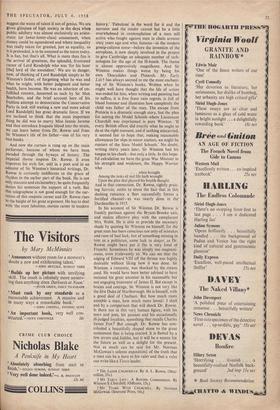The Great House
By D. W. BROGAN ACOLLEAGUE of mine has reported that, exhausted after examining, he began to read The Later Churehills* and was held like the wed- ding guest; he just had to finish it. My own experience has been the same; exhausted, al- though not by examining, I, too, found that Dr. Rowse was too much for me. I had to go on and on until the book, over 400 pages of it, was done. There are very few books published today which have this effect on a battered reviewer like myself and it is for that reason that the extra- ordinary readableness of this book should be emphasised. It is unlikely that any novel published this year will give the same amount of excitement, the same deliverance from the intrusive outside world. A reviewer owing some duties to the public that employs him, should begin by saying so. This is an enchanting performance.
It is more than that, it is a serious contribution to social history and to our understanding of the greatest living Englishman. And here, it may as well be confessed, Dr. Rowse has surprised me. For as a Liberal and, historically speaking, a Whig, I share few of Dr. Rowse's principles and none of the bees in his bonnet. The principles are expounded here; the bees buzz; but they are never allowed to get in the way of the main business. They serve (to change the metaphor) as a dash of some strong condiment, probably superfluous but not taste-killing. So the lamentations on the decadence of the present age (many of them exactly in the tiresome manner of Hilaire Belloc) can be ignored. So can specimens of under- graduate bad manners like the reference to Charles Fox and Valmy. Even the repeated in- sistence on the German origin and alleged Ger- man characteristics of the Royal Family does no real harm. (After all, Queen Elizabeth II cannot be so disposed of.) Even stress on the 'Celtic' characters of Lloyd George, Baldwin and Ramsay MacDonald does not matter too much, as Lord Randolph is charged, by virtue of his Stewart ancestry, with having some of the same character- isti'cs, none of which apparently descended to his great son. The penetrating analysis Of Sir Winston's limitations in his handling of people, his lack of the 'tactile' sense that other great political leaders had, much more than compen- sates for racial reflection.
From another trap Dr. Rowse escapes almost unscathed. He does contrast the Spencers and the Churchills (Sir Winston is a Churchill not a Spencer, or have I got it right?). But there is no automatic reliance on alleged family traits. We forget that' great men, great families have their female lines of descent. We talk glibly of 'Haps- burgs,' forgetting that in modern times we should talk of the House of Lorraine, of Spanish Bour- bons, with Alfonso XIII the spitting image of Philip IV. We talk of Russells when we should, probably, be speaking in modern times of Stan- leys. Not being a systematiser, Dr. Rowse takes each generation as it comes, His genetic allusions can be left on one side without damage, indeed with gain, to the story.
But what is the story? Would we care to be told of the successive Dukes of Marlborough after the first, if they had not produced Sir Winston? Would even Lord Randolph have justified so much industry devoted to men not always reach- ing mediocrity, dull when edifying, tiresome when not? The answer is surely no. Dr. Rowse gets round this by using the Spencers (the name Churchill was not resumed until after Waterloo; the great Duke left no male heir) as specimens of 'the Grand Whiggery,' of the 'Venetian Oligarchy,' as Dizzy put it. But faced with the job of making these men and women living to us, he gives us social history, telling us how much money was spent and on what, illustrating the great truth that nothing unites or divides families like cash. If this concentration on housekeeping has a little the air of a device, the other method by which our attention is kept from flagging until greatness returns is no device but the result of Dr. Rowse's love affair with Blenheim. We have already had, in this generation, an admirable 'house history,' Dr. Gladys Scott Thompson's account of the Russells or what might be called 'Woburn and Bloomsbury Ltd.' Her kind of social and dynastic history is not what fascinates Dr. Rowse, who tells about the Palace, the park, the extravagances of Vanbrugh, in the eighteenth century, the great recovery with Duchene in the twentieth (financed by Vanderbilt money). Contemplating the vicissi- tudes of the great house, of the collections, of the library, Dr. Rowse is effectively lyrical and one understands his dislike of an age in which Blenheims cannot be built and an only be main- tained by teas and tours. As far as I know, Blen- heim has not yet been turned into a tea house of the summer schools, but if or when it is, there is a nineteenth-century precedent provided by Dr. Rowse.
But it is people even more than palaces that fascinate Dr. Rowse and we are introduced to a series of ducal failures, some of them failures that arouse no special regrets, others failures that suggest the waste of talent if not of genius. We are given glimpses of high society in the days when public adultery was almost exclusively an aristo- cratic (or lower-lower-class) amusement, when money could be squandered and where inequality Was really taken for granted, just as equality, so it is pretended, is to be assumed as the norm today. It is fun, but that's all: What is more than fun is the arrival of greatness, the splendid, frustrated career of Lord Randolph who was 'for his hour [the] lord of the ascendant.' We are in danger, now, of thinking of Lord Randolph simply as Sir Winston's father, of forgetting what he was and what he might, with better judgment and better health, have become. He was an inheritor of un- fulfilled renown, lamented. as such by Sir Max Beerbohm, and the brief account here of his fruitless attempt to democratise the Conservative Party (a task still waiting a new and more adroit Lord Randolph) has great dramatic force. If we are inclined to think that the most important thing he did was to marry Miss Jennie Jerome and thus introduce Iroquois blood into the strain, We can learn better from Dr. Rowse and from Sir Winston's life of his father—one of his very best books.
And now the curtain is rung up on the main performer, because of Whom we have been Paraded through the byways of history. The imperial theme inspires Dr. Rowse. It even improves his style for, odd in a poet and in an admirer of Sir Winston's historical writings, Dr. Rowse is curiously indifferent to the grace of rhythm in the earlier part of the book. He is not only staccato and exclamatory; he quite frequently denies his sentences the support of a verb. But this telegraphese is not good enough for the nar- ration of this majestic career and Dr. Rowse rises to the height of his great argument. He has to deal With 'the most fabulous, outsize career in modern
history.' Fabulous' is the word for it and the narrator and the reader cannot but be a little overwhelmed in contemplation of a man still active who fought against men in chain armour sixty years ago and who, famous—in the modern gossip-column sense—before the invention of the aeroplane, is now deeply involved in the project to give Cambridge an adequate number of tech- nologists for the age of the H-bomb. The theme is almost oppressively magnificent. And Sir Winston makes things worse by being his own Thucydides and Plutarch. My Early Li/et has always seemed to me the most enchant- ing of Sir Winston's books. Written when he might well have thought that the life of action was ended for him, when writing and painting had to suffice, it is free from vain regrets, is full of bland humour and illustrates how completely the child was father of the man. The escape from Pretoria is a dramatic enough story, but the plan for seizing the Model Schools where Lieutenant Churchill was imprisoned is pure Winston. 'If every British officer did exactly what he ought to do at the right moment, and if nothing miscarried, it seemed fair to hope that, making reasonable allowances for slips in minor matters, we might be masters of the State Model Schools.' No doubt, writing thirty years later, Sir Winston had his tongue in his cheek—but only a little. In this hope- ful calculation we have the great War Minister in his strength and weakness, the Happy Warrior who
. . when brought Among the tasks of real life hath wrought Upon the plan that pleased his boyish thought.
And in that connection, Dr. Rowse, rightly prais- ing Savrola, omits to stress the fact that in this dashing romance a fleet successfully forces a fortified channel—as was nearly done in the- Dardanelles in 1915.
In his account of Sir Winston Dr. Rowse is frankly partisan against the Bryant-Brooke axis, and Makes effective play with the complacent Mrs. Webb. He is able to provide the necessary shade by quoting Sir Winston on himself, for the great man has been conscious not only of mistakes and runs of bad luck, but of something missing in him as a politician, some lack in doigrO, as Dr. Rowse might have put it (he is very fond of French). Sometimes he was simply too magnani- mous, even irrelevantly so. We can see that the edging of Edward VIII off the throne was highly desirable without liking how it was done. Sir Winston, a romantic, was shocked by the means .used. He would have been better advised to have imitated his great ancestor in his reasonable but not engaging treatment of James 11. But except in brains and courage, Sir Winston is not very like the first Duke of Marlborough. He is himself, with a good deal of Chatham. But how much more amiable a man, how much more loved! I shall end by a comparison that will shock Dr. Rowse. Is there not in this very human figure, with his tears and jests, his passion and his occasionally ill-judged loyalties, something that recalls Charles James Fox? But enough. Dr. Rowse has con- tributed a beautifully shaped stone to the great monument that is being erected. It is flawed by a few errors and foibles, but it will be a source for the future as well as a delight for the present. Not as much can be said for Mr. Norman McGowan's solemn exposition* of the truth that a man can be a hero to his valet and that a valet can write like a Times leader.
* THE LATER CHURCHILLS. By A. L. Rowse.
358.) ,
t MY EARLY LIFE: A ROVING COMMISSION. By Winston S. Churchill. (Odhams, 15s.) MY YEARS WITH CHURCHILL. By Norman McGowan. (Souvenir Press, 16s.)























































 Previous page
Previous page